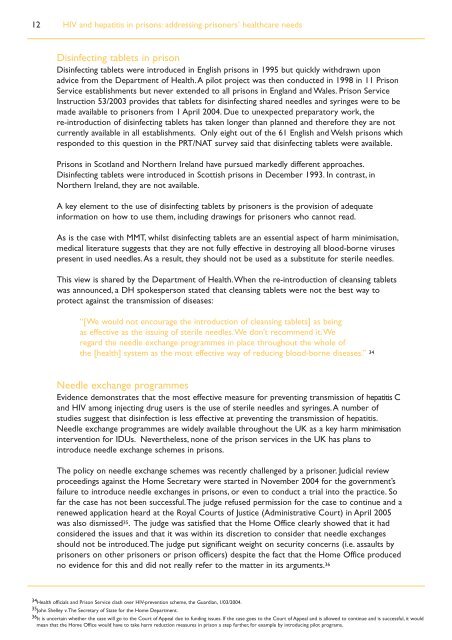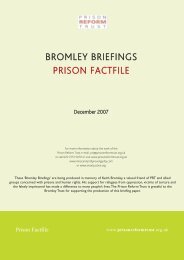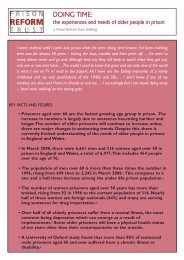HIV and Hepatitis in UK Prisons - Prison Reform Trust
HIV and Hepatitis in UK Prisons - Prison Reform Trust
HIV and Hepatitis in UK Prisons - Prison Reform Trust
You also want an ePaper? Increase the reach of your titles
YUMPU automatically turns print PDFs into web optimized ePapers that Google loves.
12 <strong>HIV</strong> <strong>and</strong> hepatitis <strong>in</strong> prisons: address<strong>in</strong>g prisoners’ healthcare needs<br />
Dis<strong>in</strong>fect<strong>in</strong>g tablets <strong>in</strong> prison<br />
Dis<strong>in</strong>fect<strong>in</strong>g tablets were <strong>in</strong>troduced <strong>in</strong> English prisons <strong>in</strong> 1995 but quickly withdrawn upon<br />
advice from the Department of Health.A pilot project was then conducted <strong>in</strong> 1998 <strong>in</strong> 11 <strong>Prison</strong><br />
Service establishments but never extended to all prisons <strong>in</strong> Engl<strong>and</strong> <strong>and</strong> Wales. <strong>Prison</strong> Service<br />
Instruction 53/2003 provides that tablets for dis<strong>in</strong>fect<strong>in</strong>g shared needles <strong>and</strong> syr<strong>in</strong>ges were to be<br />
made available to prisoners from 1 April 2004. Due to unexpected preparatory work, the<br />
re-<strong>in</strong>troduction of dis<strong>in</strong>fect<strong>in</strong>g tablets has taken longer than planned <strong>and</strong> therefore they are not<br />
currently available <strong>in</strong> all establishments. Only eight out of the 61 English <strong>and</strong> Welsh prisons which<br />
responded to this question <strong>in</strong> the PRT/NAT survey said that dis<strong>in</strong>fect<strong>in</strong>g tablets were available.<br />
<strong><strong>Prison</strong>s</strong> <strong>in</strong> Scotl<strong>and</strong> <strong>and</strong> Northern Irel<strong>and</strong> have pursued markedly different approaches.<br />
Dis<strong>in</strong>fect<strong>in</strong>g tablets were <strong>in</strong>troduced <strong>in</strong> Scottish prisons <strong>in</strong> December 1993. In contrast, <strong>in</strong><br />
Northern Irel<strong>and</strong>, they are not available.<br />
A key element to the use of dis<strong>in</strong>fect<strong>in</strong>g tablets by prisoners is the provision of adequate<br />
<strong>in</strong>formation on how to use them, <strong>in</strong>clud<strong>in</strong>g draw<strong>in</strong>gs for prisoners who cannot read.<br />
As is the case with MMT, whilst dis<strong>in</strong>fect<strong>in</strong>g tablets are an essential aspect of harm m<strong>in</strong>imisation,<br />
medical literature suggests that they are not fully effective <strong>in</strong> destroy<strong>in</strong>g all blood-borne viruses<br />
present <strong>in</strong> used needles.As a result, they should not be used as a substitute for sterile needles.<br />
This view is shared by the Department of Health.When the re-<strong>in</strong>troduction of cleans<strong>in</strong>g tablets<br />
was announced, a DH spokesperson stated that cleans<strong>in</strong>g tablets were not the best way to<br />
protect aga<strong>in</strong>st the transmission of diseases:<br />
“[We would not encourage the <strong>in</strong>troduction of cleans<strong>in</strong>g tablets] as be<strong>in</strong>g<br />
as effective as the issu<strong>in</strong>g of sterile needles.We don't recommend it.We<br />
regard the needle exchange programmes <strong>in</strong> place throughout the whole of<br />
the [health] system as the most effective way of reduc<strong>in</strong>g blood-borne diseases.” 34<br />
Needle exchange programmes<br />
Evidence demonstrates that the most effective measure for prevent<strong>in</strong>g transmission of hepatitis C<br />
<strong>and</strong> <strong>HIV</strong> among <strong>in</strong>ject<strong>in</strong>g drug users is the use of sterile needles <strong>and</strong> syr<strong>in</strong>ges.A number of<br />
studies suggest that dis<strong>in</strong>fection is less effective at prevent<strong>in</strong>g the transmission of hepatitis.<br />
Needle exchange programmes are widely available throughout the <strong>UK</strong> as a key harm m<strong>in</strong>imisation<br />
<strong>in</strong>tervention for IDUs. Nevertheless, none of the prison services <strong>in</strong> the <strong>UK</strong> has plans to<br />
<strong>in</strong>troduce needle exchange schemes <strong>in</strong> prisons.<br />
The policy on needle exchange schemes was recently challenged by a prisoner. Judicial review<br />
proceed<strong>in</strong>gs aga<strong>in</strong>st the Home Secretary were started <strong>in</strong> November 2004 for the government’s<br />
failure to <strong>in</strong>troduce needle exchanges <strong>in</strong> prisons, or even to conduct a trial <strong>in</strong>to the practice. So<br />
far the case has not been successful.The judge refused permission for the case to cont<strong>in</strong>ue <strong>and</strong> a<br />
renewed application heard at the Royal Courts of Justice (Adm<strong>in</strong>istrative Court) <strong>in</strong> April 2005<br />
was also dismissed 35 . The judge was satisfied that the Home Office clearly showed that it had<br />
considered the issues <strong>and</strong> that it was with<strong>in</strong> its discretion to consider that needle exchanges<br />
should not be <strong>in</strong>troduced.The judge put significant weight on security concerns (i.e. assaults by<br />
prisoners on other prisoners or prison officers) despite the fact that the Home Office produced<br />
no evidence for this <strong>and</strong> did not really refer to the matter <strong>in</strong> its arguments. 36<br />
34 Health officials <strong>and</strong> <strong>Prison</strong> Service clash over <strong>HIV</strong>-prevention scheme, the Guardian, 1/03/2004.<br />
35 John Shelley v.The Secretary of State for the Home Department.<br />
36 It is uncerta<strong>in</strong> whether the case will go to the Court of Appeal due to fund<strong>in</strong>g issues. If the case goes to the Court of Appeal <strong>and</strong> is allowed to cont<strong>in</strong>ue <strong>and</strong> is successful, it would<br />
mean that the Home Office would have to take harm reduction measures <strong>in</strong> prison a step further, for example by <strong>in</strong>troduc<strong>in</strong>g pilot programs.

















